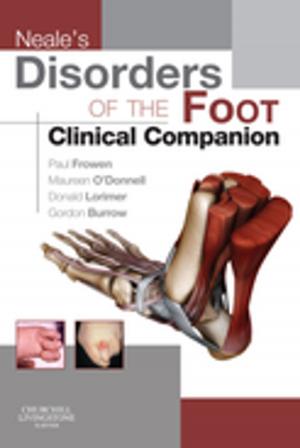Handbook of Veterinary Pain Management - E-Book
Nonfiction, Health & Well Being, Medical, Veterinary Medicine| Author: | James S. Gaynor, DVM, MS, DACVA, DAAPM, William W. Muir III, DVM, PhD | ISBN: | 9780323222143 |
| Publisher: | Elsevier Health Sciences | Publication: | August 13, 2014 |
| Imprint: | Mosby | Language: | English |
| Author: | James S. Gaynor, DVM, MS, DACVA, DAAPM, William W. Muir III, DVM, PhD |
| ISBN: | 9780323222143 |
| Publisher: | Elsevier Health Sciences |
| Publication: | August 13, 2014 |
| Imprint: | Mosby |
| Language: | English |
Trust the Handbook of Veterinary Pain Management, 3rd Edition to help you meet the increasing need for effective pain management in the animals you treat. This user-friendly guide contains the most up-to-date and clinically relevant information on analgesic drugs and managing pain in dogs, cats, birds, reptiles, ferrets, and rabbits. It specifically covers the areas of pain assessment, pharmaceutical and non-pharmaceutical treatment options, guidelines for managing acute and chronic pain, and unique aspects of pain management. This edition also incorporates expanded information on cats, exotics, the latest drugs, and more to keep you on top of today’s best practices in veterinary pain management.
-
The latest information on complementary and alternative strategies for pain management offers the guidance to help youincorporate non-pharmacologic treatments into their pain management programs.
-
Numerous boxes and tables summarize pharmacologic protocols and clinical applications, with dosages, indications, contraindications, and side effects to provide you with the comprehensive drug information needed to find the most effective and appropriate treatment.
-
User-friendly format helps you quickly and easily find essential information.
-
Case studies illustrating realistic clinical scenarios help you learn how to assess and manage pain in the clinical setting.
-
NEW! Eight new chapters include the latest information on:
-
the human-animal bond
local and regional techniques
preventive and multimodal analgesia
energy modalities
acupuncture
physical examination with emphasis on isolating and locating pain
therapeutic goals
pain in laboratory animals
-
NEW! Completely updated drug information, with new agents, doseforms, and routes provides the most current pain management therapies for use in the clinical setting.
-
NEW! Expanded sections on the cat and exotics address the growing popularity of these pets by providing additional species-specific information.
Trust the Handbook of Veterinary Pain Management, 3rd Edition to help you meet the increasing need for effective pain management in the animals you treat. This user-friendly guide contains the most up-to-date and clinically relevant information on analgesic drugs and managing pain in dogs, cats, birds, reptiles, ferrets, and rabbits. It specifically covers the areas of pain assessment, pharmaceutical and non-pharmaceutical treatment options, guidelines for managing acute and chronic pain, and unique aspects of pain management. This edition also incorporates expanded information on cats, exotics, the latest drugs, and more to keep you on top of today’s best practices in veterinary pain management.
-
The latest information on complementary and alternative strategies for pain management offers the guidance to help youincorporate non-pharmacologic treatments into their pain management programs.
-
Numerous boxes and tables summarize pharmacologic protocols and clinical applications, with dosages, indications, contraindications, and side effects to provide you with the comprehensive drug information needed to find the most effective and appropriate treatment.
-
User-friendly format helps you quickly and easily find essential information.
-
Case studies illustrating realistic clinical scenarios help you learn how to assess and manage pain in the clinical setting.
-
NEW! Eight new chapters include the latest information on:
-
the human-animal bond
local and regional techniques
preventive and multimodal analgesia
energy modalities
acupuncture
physical examination with emphasis on isolating and locating pain
therapeutic goals
pain in laboratory animals
-
NEW! Completely updated drug information, with new agents, doseforms, and routes provides the most current pain management therapies for use in the clinical setting.
-
NEW! Expanded sections on the cat and exotics address the growing popularity of these pets by providing additional species-specific information.















